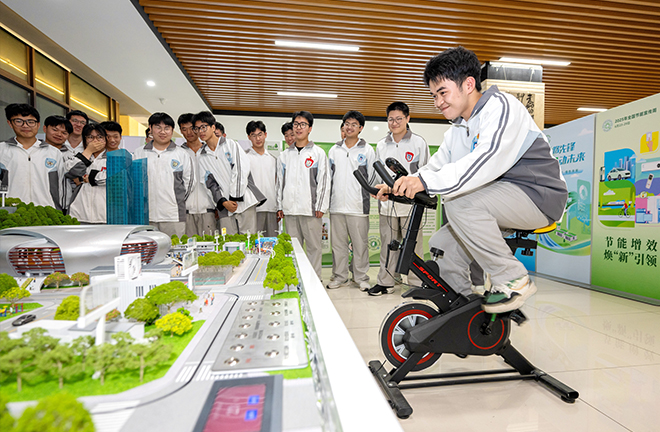Advancing green, low-carbon consumption in China

On June 23, a campus campaign promoting energy conservation and low-carbon living was held in Changxing County, Huzhou City, Zhejiang Province. Volunteers used an urban sandbox to teach students about green, low-carbon practices and energy-saving knowledge, while also guiding them in experiencing eco-friendly lifestyles, such as riding green bicycles. Photo: IC PHOTO
Green consumption is a key measure in China’s efforts to build an ecological civilization and achieve its dual goals of peak carbon and carbon neutrality. Although China’s green consumption efforts began later than those of some developed countries, they have made rapid progress, with the green consumption market expanding steadily. Nevertheless, challenges persist, requiring sustained efforts to improve green consumption laws and regulations, as well as to raise public awareness.
Concept must be fully translated into practice
In recent years, the Chinese government has issued several macro-level policies to promote green consumption, including the “Guidelines on Promoting Green Consumption” in 2016, and the “Implementation Plan for Promoting Green Consumption” in 2022. However, micro-level policies remain inadequate, and a comprehensive policy framework has yet to be established. Some enterprises, lacking clear directives and technical standards, have yet to fully incorporate green, low-carbon technologies in production, undermining product performance and efficiency. Meanwhile, regulatory authorities face issues like inconsistent standards and insufficient enforcement in product audits. In areas such as recycling and waste disposal, policy inadequacies sometimes exacerbate rather than reduce resource waste and environmental damage.
A coordinated and efficient regulatory system for green, low-carbon products—primarily involving the government and businesses—has yet to be established. When government oversight lacks specificity or adaptability, it may place undue burdens on businesses. Regulatory approaches should be updated to become more diversified and targeted. On the production side, companies must assume a greater sense of social responsibility, implementing green, low-carbon principles across all stages of the product life cycle.
According to the “Survey on Citizens’ Ecological and Environment Behavior” conducted by the Ministry of Ecology and Environment of the PRC in 2022, while the Chinese public generally exhibits a strong willingness to engage in environmentally responsible behavior, actual practices vary across domains. “Green consumption,” in particular, remains a relatively weak area, with only a modest share of consumers frequently purchasing green products. This shortfall may stem from two factors. First, although many people recognize the importance of green consumption, they often prioritize price and convenience, opting for non-green alternatives. Second, some consumers have limited understanding of the benefits and significance of green products.
Improving policy framework and enhancing consumer education
Strengthening policy guidance to stimulate market demand for green, low-carbon consumption: To better guide the market, the government can gather input from stakeholders across the entire production-to-consumption chain when formulating green, low-carbon consumption policies and dedicated legislation tailored to China’s national conditions. Unlike traditional punitive regulatory models, the policy framework for green, low-carbon consumption should incorporate incentive mechanisms to unleash market vitality. Policy tools such as tax incentives, subsidies, and credit support can encourage businesses to adopt greener practices and increase investment in research and development, thereby reducing production costs and enhancing the appeal of green products to consumers.
Regulating the market for green, low-carbon products: First, formulating clear standards and regulations for green, low-carbon industries can help businesses avoid ill-informed investments. To maintain market order, harsher penalties should be imposed on businesses that violate relevant laws and regulations. Second, a rigorous green product certification system should be established to ensure product quality and crack down on false or misleading green claims. Third, the development of a robust “green finance” system should be accelerated, providing diversified financing channels for businesses through instruments such as policy-guided funds, concessional loans, and green bonds.
Fostering a culture of green, low-carbon consumption and encouraging consumer initiative: Various means such as media campaigns, civic education, and community activities can help consumers fully understand the contribution of green, low-carbon consumption to environmental protection and sustainable development. This understanding, in turn, will foster conscious and informed green, low-carbon consumption, making it a habitual part of everyday life.
Ma Yong is a professor from the Business School at Hubei University.
Edited by WANG YOURAN
